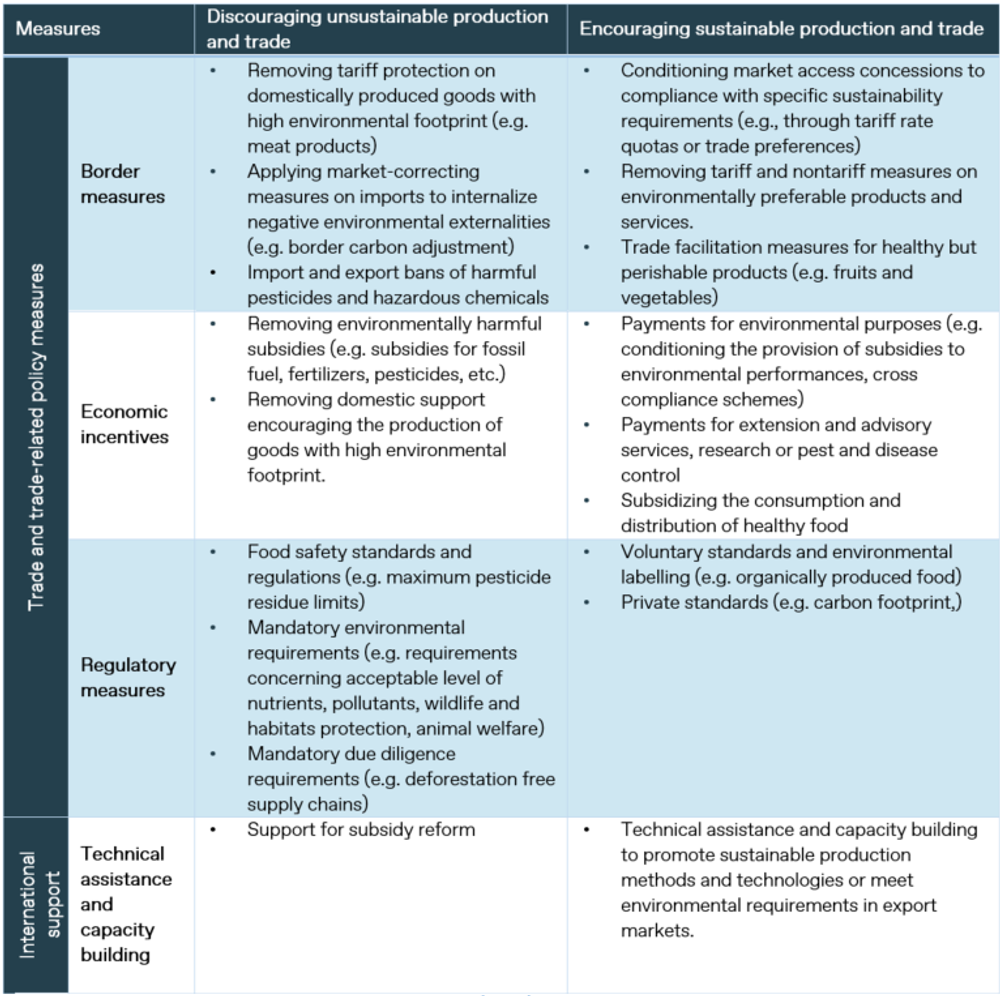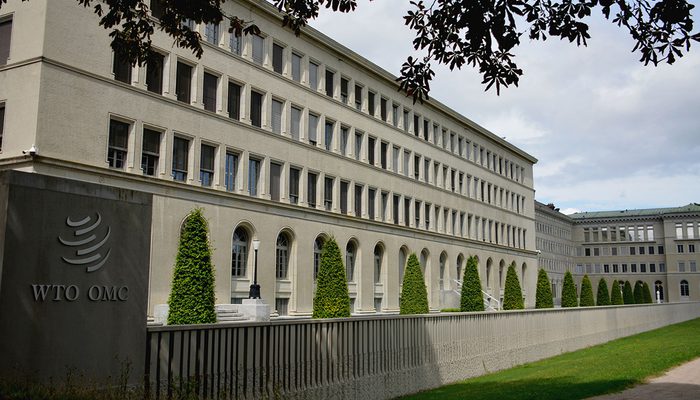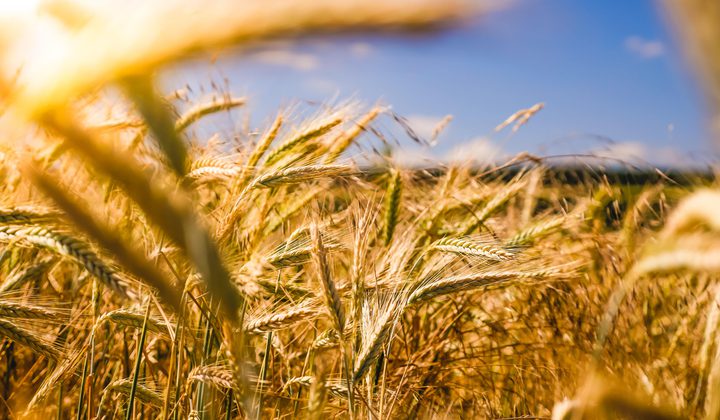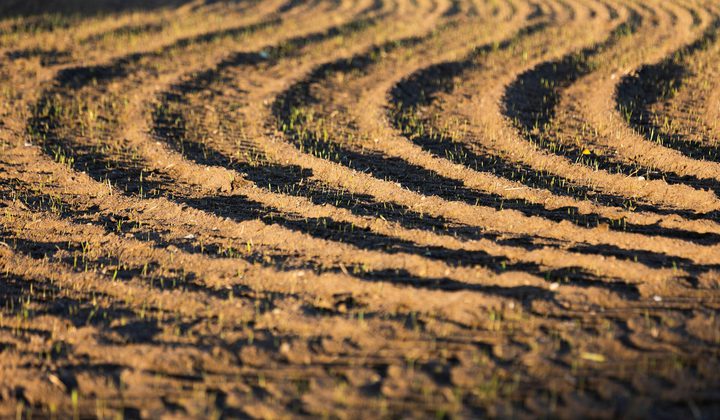There are several avenues through which WTO members could address the urgent need for the multilateral trading system to foster an open and inclusive dialogue on the sustainability dimensions of agricultural production and trade.
This article is part of a Synergies series on reviving multilateralism curated by TESS titled From Vision to Action on Trade and Sustainability at the WTO.
Any views and opinions expressed are those of the author(s) and do not
necessarily reflect those of TESS or any of its partner organizations or
funders.
-----
Agriculture represents a critical source of food, feed, fuel, and livelihood. Yet, the current food system remains largely unsustainable and fails to deliver food and nutrition security for all. In recent years, progress in reducing food insecurity have been reversed, with the number of hungry people increasing by 20% between 2018 and 2022. Climate change, a global pandemic, and escalating conflicts have all contributed to making food less accessible to many, particularly women and people living in rural areas, whether in terms of physical or economic scarcity. In 2023, the Food and Agriculture Organization of the United Nations (FAO) estimated that the number of people chronically at risk of not having enough food for a healthy life had reached between 713–757 million people. The FAO also estimates that 35.5% of the global population was unable to afford a healthy diet in 2022.
At the same time, agriculture contributes to environmental degradation, including soil and water pollution and biodiversity loss. Between 2000 and 2018, agricultural expansion drove 88% of global deforestation, with cropland expansion and livestock grazing respectively responsible for 50% and 38% of deforestation. Food systems also account for as much as 34% of total greenhouse gas emissions, when considering agriculture and land use, storage, transport, packaging, processing, retail, and consumption. Meanwhile, impacts of climate change affect crop yields, productivity, and ultimately food security and nutrition through increasing temperatures, changing precipitation patterns, and greater frequency of extreme weather conditions.
Over the coming years, one of the greatest challenges facing the agricultural sector will be to improve equitable access, availability, and stability of food supply and respond to the changing diet of a growing urban population while protecting ecosystems, restoring biodiversity, maintaining soil productivity, rationalizing water use, and reducing greenhouse gas emissions.
Trade and Sustainable Agriculture: A Multidimensional Relation
In today’s highly integrated global economy, international trade and trade policies will play a critical role in this equation. In the absence of effective regulatory frameworks, trade can exacerbate environmental challenges associated with food production and land use trends such as deforestation, land degradation, increased greenhouse gas emissions, and biodiversity loss. Indiscriminate trade opening can also disrupt local food production systems, markets, and communities, or introduce unhealthy foods that generate public health challenges.
On the other hand, trade plays a critical role in ensuring access to food and a balanced diet for the vast majority of countries that rely on imports to meet at least part of their nutritional needs. Over the last 20 years, trade in agricultural products has almost doubled in volume, with the share of imports in global consumption growing significantly for products such as wheat, maize, rice, soybeans, vegetable oil or meat. In the future, trade will also play an essential role in tackling food insecurity by offsetting production shortfalls resulting from the climate crisis, water scarcity, or desertification. Participation in international supply chains can also help diffuse environmentally sustainable practices or technologies and support higher returns for sustainably produced food. More generally, trade can be key to creating jobs and raising incomes, thereby contributing to improved access to nutritious food.
In spite of this, agricultural markets remain particularly thin, with the share of production traded internationally only reaching 23% on average and even less for key staple foods such as rice or maize. As a result, a growing number of countries depend on a few exporters to meet their nutritional needs—which makes them highly vulnerable to supply chain disruptions and price volatility, as illustrated by the price spikes from 2006–2008 and, more recently, the food and energy price crises associated with the Covid-19 pandemic or the conflict in Ukraine. These interdependencies highlight the importance of collective action to ensure sustainable and resilient food systems.
These interdependencies highlight the importance of collective action to ensure sustainable and resilient food systems.
The need to ensure that trade policies proactively deliver for sustainable agriculture has been repeatedly affirmed at the highest political level, for example through the Leaders’ Declaration on Forests and Land, signed by 141 countries at the 2021 UN Climate Change Conference (COP 26) in Glasgow, and the Forests, Agriculture and Commodity Trade (FACT) Dialogue, supported by key global exporters and importers of agricultural commodities. Focusing on the negative environmental effects of support policies, Target 18 of the Kunming-Montreal Global Biodiversity Framework calls for addressing subsidies harmful to biodiversity in a "proportionate, just, fair, effective and equitable way" and reducing them by at least $500 billion by 2030, starting with the most harmful incentives. Countries are also taking a range of autonomous measures, as illustrated by the European Union mandatory due diligence requirement on deforestation-free supply chains. Finally, numerous private sector initiatives and international organizations are working to improve the sustainability of global supply chains, for example, through voluntary standards and traceability and transparency requirements.
How Can Trade Policy Contribute to Sustainable Agriculture?
Governments have a range of trade-related policy tools at their disposal to promote more environmentally sustainable agricultural practices or production methods.
Faced with the pressing need to address sustainability concerns, governments have a range of trade-related policy tools at their disposal to promote more environmentally sustainable agricultural practices or production methods. These can either encourage sustainable agriculture production and trade or discourage unsustainable practices. The measures themselves can take the form of:
- Measures at the border, such as tariffs targeting mostly imports.
- Economic incentives, such as subsidies targeting mostly domestic producers.
- Regulatory measures of a voluntary or mandatory nature targeting both domestic producers and imports.
- International support measures promoting sustainable production and trade in third countries, for example through technical assistance or technology transfer.
The table provides an overview of different approaches, with examples of measures discouraging and unsustainable production and trade and encouraging sustainable production and trade under each of the four categories.

Sample of trade-related policy tools to promote sustainable agriculture (adapted from Bellmann (2022))
What Role for the WTO?
The measures highlighted in the table can, for the most part, be pursued by governments acting autonomously. To the extent that they are designed as good faith environmental policies and do not discriminate arbitrarily between countries where the same conditions prevail, they will most probably not violate existing World Trade Organization (WTO) rules. The effectiveness of these measures will however significantly increase if they are pursued collectively and applied consistently among a range of countries. The benefits of such international cooperation is particularly clear in the case of measures aimed at removing perverse incentives, such as environmentally harmful subsidies, or fostering trade in environmentally preferable products. In a similar vein, ensuring that environmental regulations, standards, and conformity assessment procedures are applied in a way that ensures interoperability across countries and minimizes trade frictions will send a powerful signal of coherence to exporters. More broadly, in a globalized world economy dominated by highly integrated supply chains, addressing transboundary environmental challenges, such as climate change and biodiversity loss, and food and nutrition insecurity increasingly requires coherent policy approaches across jurisdictions.
Acknowledging this reality, several countries have emphasized the need to address collectively the sustainability dimension of agriculture in WTO. Today however, there is no single forum to discuss cooperation on trade and sustainable agriculture in the multilateral trading system. While the Committee on Trade and Environment could arguably provide a space for such a discussion, this has only happened sporadically with individual members raising specific concerns (e.g. on deforestation related to agriculture). Nor is sustainable agriculture explicitly addressed in the current WTO negotiating track under the Special Session of the Committee on Agriculture (CoA-SS); and experience has shown that achieving progress on this front has been challenging.
A third avenue is the Trade and Environmental Sustainability Structured Discussions (TESSD), launched to advance policy dialogue, promote transparency, and identify areas for future work including possible “deliverables” on environmental sustainability in the WTO. While TESSD does not have a specific work stream on sustainable agriculture besides its informal working group on subsidies, which addresses the sustainability dimension of agricultural domestic support, several proposals circulated since 2021 have identified issues related to agricultural standards and regulations, sustainable commodities, and deforestation-free supply chains as a topic for discussion.
There is no single forum to discuss cooperation on trade and sustainable agriculture in the multilateral trading system.
Moving forward, fostering a more systematic dialogue on sustainable agriculture could involve reinvigorating discussions under relevant regular committees including the Committee on Trade and Environment and the Committee on Agriculture. In this respect, the work programme on emergency response to food insecurity established after the Twelfth WTO Ministerial Conference in 2022 provides an interesting precedent. Beyond the regular bodies, concerns around sustainable agriculture could feature more systematically in the context of the Aid for Trade initiative and related support measures under the Enhanced Integrated Framework (EIF) and the Standards and Trade Development Facility (STDF). Similarly, the WTO Secretariat could include consideration of climate and other environmental risks and vulnerabilities in sections of Trade Policy Review reports dealing with agriculture. Additionally, Brazil has proposed to initiate a dedicated dialogue on sustainable agriculture in the multilateral trading system under the direction of the General Council as a complement to the existing negotiating track under the CoA-SS. This would provide a space for a forward-looking discussions on how the multilateral trading system can better support sustainable agriculture.
Regardless of where such discussion takes place, there is an urgent need for the multilateral trading system to foster an open and inclusive dialogue on a topic that is only likely to gain in momentum and importance over the coming years. Such efforts should not detract or divert attention from ongoing agriculture negotiations at the WTO, but rather complement them and contribute to catalysing discussions on how cooperation on trade and trade policies can contribute to a more sustainable food and agricultural system. Importantly, these discussions should take a comprehensive approach integrating not only concerns around environmental sustainability but also critical public policy objectives including food and nutrition security, livelihoods, and rural development.
----------
Christophe Bellmann is Head of Policy Analysis and Strategy, Forum on Trade, Environment, & the SDGs (TESS).
-----
Synergies by TESS is a blog dedicated to promoting inclusive policy dialogue at the intersection of trade, environment, and sustainable development, drawing on perspectives from a range of experts from around the globe. The editor is Fabrice Lehmann.
Disclaimer
Any views and opinions expressed on Synergies are those of the author(s) and do not necessarily reflect those of TESS or any of its partner organizations or funders.
License
All of the content on Synergies is licensed under a Creative Commons Attribution-NonCommercial-ShareAlike 4.0 International (CC BY-NC-SA 4.0)
license. This means you are welcome to adapt, copy, and share it on your
platforms with attribution to the source and author(s), but not for
commercial purposes. You must also share it under the same CC BY-NC-SA
4.0 license.
If you would like to reuse any material published here or if you have any other question related to Synergies, send an email to fabrice.lehmann@graduateinstitute.ch.
TESS at the World Trade Organization
This work is part of our initiative supporting inclusive cooperation
on trade, environment, and sustainable development at the WTO.





